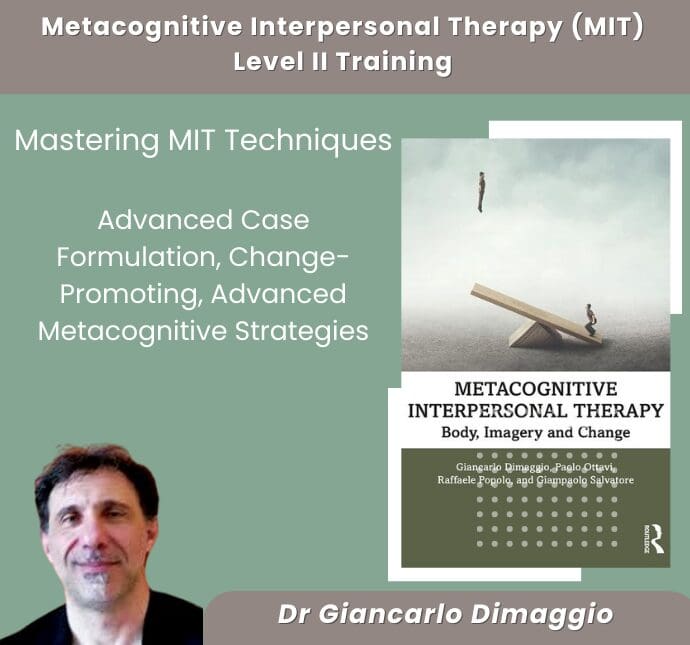Metacognitive Interpersonal Therapy (MIT) for Personality Disorders Level II Training - Mastering MIT Techniques
MIT advanced skills training
This advanced training program focuses on mastering complex interventions, advanced case formulation, and sophisticated application of MIT principles.

Mastering MIT skills
Building on the foundations of MIT Level I Training, this advanced training program is designed for practitioners who actively work with people with personality disorders and seek to deepen their therapeutic expertise. MIT Level 2 provides comprehensive skill development through supervised practice, video analysis, and peer consultation. The program emphasises change-promoting techniques, management of therapeutic challenges, and advanced metacognitive monitoring strategies. Participants will develop mastery in handling complex cases while receiving expert guidance and feedback.



Publication
The ongoing rewriting of the therapeutic contract in Metacognitive Interpersonal Therapy for narcissistic personality disorder: The case of Mark
Details
Prerequisites
Completion of Level 1 training
Active clinical practice with personality disorder cases
Format
- Live webinars
- 6 modules of advanced training - 18 hours of contact
- Small group size (8 – 12 participants)
Cost:
- TBA
Gain advanced skills in work with people with personality disorders.
Metacognitive Interpersonal Therapy is an effective approach for working with individuals with personality disorders, associated symptoms, and behavioural comorbidities. It is receiving increased empirical support from various studies. MIT involves shared case formulation, continuous alignment, and negotiated goals and tasks. Therapists use experiential techniques during and between sessions to help clients make positive changes.
Program Highlights
- Advanced schema reconstruction techniques and interventions
- In-depth experiential techniques, including guided imagery, rescripting, and body-oriented work
- Complex case formulation and treatment planning
- Mastery of MIT therapeutic relationship principles
- Advanced role-play and clinical simulation practices
- Integration of metacognitive monitoring in challenging cases
- Supervision and feedback on real clinical cases
Core Competencies Addressed
- Implementing advanced schema reconstruction techniques
- Mastering experiential interventions for emotional regulation
- Developing sophisticated case formulations
- Managing complex therapeutic relationships
- Applying advanced metacognitive monitoring techniques
- Implementing fine-tuned interventions based on individual case formulations
- Handling therapeutic ruptures and impasses
Program Structure
- Advanced 6 module intensive format
- Emphasis on supervised practice and skill development
- Regular case consultation and feedback
- Experiential learning through complex role-play scenarios
- Video analysis of therapy sessions
- Peer supervision groups
- Individual mentoring sessions
Is MIT Level ll Training Right For YOU?
This advanced training is ideal for:
- Practitioners who have completed MIT Level I training
- Clinicians actively working with personality disorder cases
Therapists seeking to:
- Deepen their MIT intervention skills
- Handle complex cases effectively
- Master experiential techniques
- Develop advanced case formulation abilities
Participants should have:
- Current active caseload of personality disorder clients
- Experience in basic MIT principles and techniques
- Commitment to intensive skill development
- Willingness to present and discuss clinical cases
Join a Community of Practice
Become part of a supportive network of like-minded peers and experienced practitioners, fostering your growth as an MIT advanced practitioner.
What Our Participants Say
"The MIT Level II training took my practice and understanding of personality disorders to the next level. Giancarlo's teaching method and in-depth knowledge of the topic helped me feel confident to be able to work with the most complex of presentations"

Dr Giancarlo Dimaggio, a psychiatrist and psychotherapist, is a co-founding member of the Center for Metacognitive Interpersonal Therapy in Rome, Italy, and trainer for the Italian Society of Cognitive and Behaviour Psychotherapy (SITCC). His primary interest is in personality disorders. He has co-authored and edited six books on psychopathology and psychotherapy and more than 250 papers in scientific journals. Dr Dimaggio is editor-in-chief of the Journal of Clinical Psychology: In-Session, an associate editor of Psychology and Psychotherapy and the Journal of Psychotherapy Integration.

